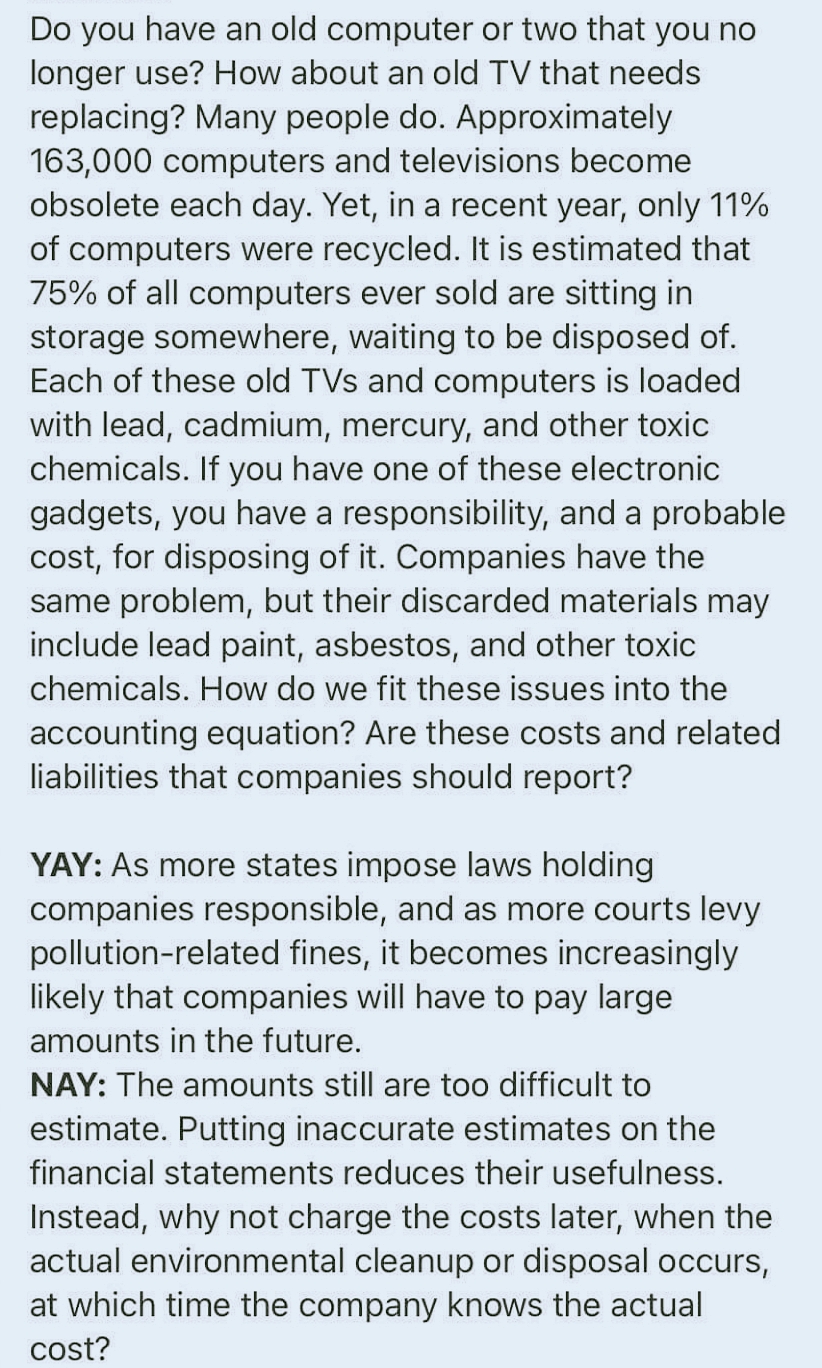Do you have an old computer or two that you no longer use? How about an old TV that needs replacing? Many people do. Approximately 163,000 computers and televisions become obsolete each day. Yet, in a recent year, only 11% of computers were recycled. It is estimated that 75% of all computers ever sold are sitting in storage somewhere, waiting to be disposed of. Each of these old TVs and computers is loaded with lead, cadmium, mercury, and other toxic chemicals. If you have one of these electronic gadgets, you have a responsibility, and a probable cost, for disposing of it. Companies have the same problem, but their discarded materials may include lead paint, asbestos, and other toxic chemicals. How do we fit these issues into the accounting equation? Are these costs and related liabilities that companies should report? YAY: As more states impose laws holding companies responsible, and as more courts levy pollution-related fines, it becomes increasingly likely that companies will have to pay large amounts in the future. NAY: The amounts still are too difficult to estimate. Putting inaccurate estimates on the financial statements reduces their usefulness. Instead, why not charge the costs later, when the actual environmental cleanup or disposal occurs, at which time the company knows the actual cost?
Do you have an old computer or two that you no longer use? How about an old TV that needs replacing? Many people do. Approximately 163,000 computers and televisions become obsolete each day. Yet, in a recent year, only 11% of computers were recycled. It is estimated that 75% of all computers ever sold are sitting in storage somewhere, waiting to be disposed of. Each of these old TVs and computers is loaded with lead, cadmium, mercury, and other toxic chemicals. If you have one of these electronic gadgets, you have a responsibility, and a probable cost, for disposing of it. Companies have the same problem, but their discarded materials may include lead paint, asbestos, and other toxic chemicals. How do we fit these issues into the accounting equation? Are these costs and related liabilities that companies should report? YAY: As more states impose laws holding companies responsible, and as more courts levy pollution-related fines, it becomes increasingly likely that companies will have to pay large amounts in the future. NAY: The amounts still are too difficult to estimate. Putting inaccurate estimates on the financial statements reduces their usefulness. Instead, why not charge the costs later, when the actual environmental cleanup or disposal occurs, at which time the company knows the actual cost?
Chapter11: Long-term Assets
Section: Chapter Questions
Problem 5TP: Your family started a new manufacturing business making outdoor benches for use in parks and outdoor...
Related questions
Question
Please see the attached photo.
Question:
What is your response indicating your position regarding this situation and please provide support for your view.

Transcribed Image Text:Do you have an old computer or two that you no
longer use? How about an old TV that needs
replacing? Many people do. Approximately
163,000 computers and televisions become
obsolete each day. Yet, in a recent year, only 11%
of computers were recycled. It is estimated that
75% of all computers ever sold are sitting in
storage somewhere, waiting to be disposed of.
Each of these old TVs and computers is loaded
with lead, cadmium, mercury, and other toxic
chemicals. If you have one of these electronic
gadgets, you have a responsibility, and a probable
cost, for disposing of it. Companies have the
same problem, but their discarded materials may
include lead paint, asbestos, and other toxic
chemicals. How do we fit these issues into the
accounting equation? Are these costs and related
liabilities that companies should report?
YAY: As more states impose laws holding
companies responsible, and as more courts levy
pollution-related fines, it becomes increasingly
likely that companies will have to pay large
amounts in the future.
NAY: The amounts still are too difficult to
estimate. Putting inaccurate estimates on the
financial statements reduces their usefulness.
Instead, why not charge the costs later, when the
actual environmental cleanup or disposal occurs,
at which time the company knows the actual
cost?
Expert Solution
This question has been solved!
Explore an expertly crafted, step-by-step solution for a thorough understanding of key concepts.
This is a popular solution!
Trending now
This is a popular solution!
Step by step
Solved in 2 steps

Knowledge Booster
Learn more about
Need a deep-dive on the concept behind this application? Look no further. Learn more about this topic, accounting and related others by exploring similar questions and additional content below.Recommended textbooks for you

Principles of Accounting Volume 1
Accounting
ISBN:
9781947172685
Author:
OpenStax
Publisher:
OpenStax College

Cornerstones of Cost Management (Cornerstones Ser…
Accounting
ISBN:
9781305970663
Author:
Don R. Hansen, Maryanne M. Mowen
Publisher:
Cengage Learning

Principles of Accounting Volume 2
Accounting
ISBN:
9781947172609
Author:
OpenStax
Publisher:
OpenStax College

Principles of Accounting Volume 1
Accounting
ISBN:
9781947172685
Author:
OpenStax
Publisher:
OpenStax College

Cornerstones of Cost Management (Cornerstones Ser…
Accounting
ISBN:
9781305970663
Author:
Don R. Hansen, Maryanne M. Mowen
Publisher:
Cengage Learning

Principles of Accounting Volume 2
Accounting
ISBN:
9781947172609
Author:
OpenStax
Publisher:
OpenStax College

EBK CONTEMPORARY FINANCIAL MANAGEMENT
Finance
ISBN:
9781337514835
Author:
MOYER
Publisher:
CENGAGE LEARNING - CONSIGNMENT

Managerial Accounting: The Cornerstone of Busines…
Accounting
ISBN:
9781337115773
Author:
Maryanne M. Mowen, Don R. Hansen, Dan L. Heitger
Publisher:
Cengage Learning
